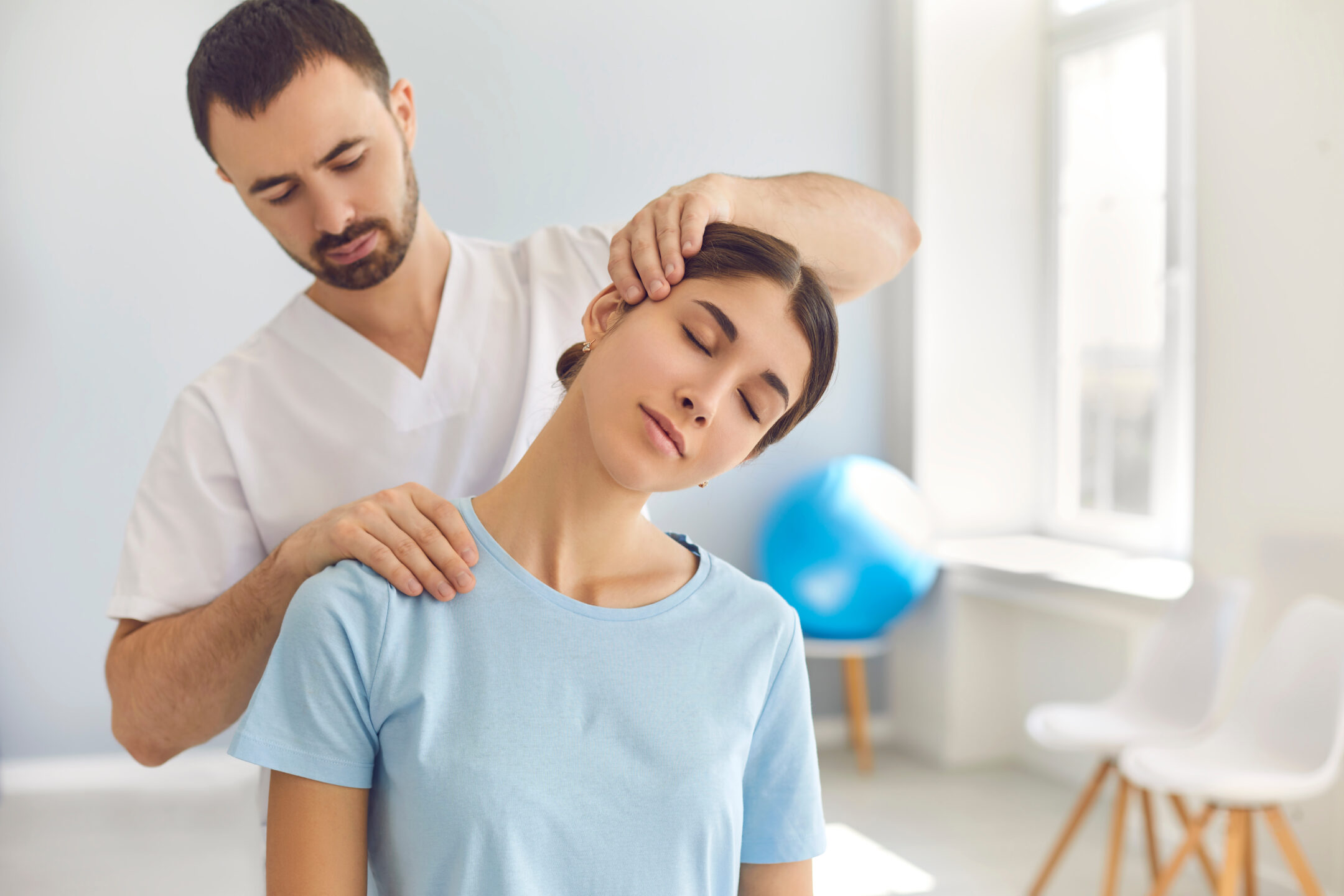Use our convenient online scheduler to book an appointment now.

Do you ever experience your neck cracking, a crunching sound in the neck, or neck popping when turning your head? This phenomenon may represent neck crepitus. Neck crepitus alone is usually not concerning. However, it may indicate a more serious medical issue if associated with pain, or trauma, or becomes more frequent and repetitive.
Neck Cracking: What is Neck Crepitus?
Neck crepitus is a crunching or crackling sound when the neck is moved. It generally represents a release of gas bubbles from the spine’s joints in the neck. These are called facet joints. Similar to many other joints in the body, they have lubricating fluid and can develop gas bubbles with changes in pressure. The cracking sound represents a release of these gas bubbles.
Cracking, or crepitus, sounds can also represent the movement of tendons, ligaments, and bone surfaces across one another. This becomes more common with degenerative changes in the spine, muscle tightness, or poor posture. It can also occur with arthritis in the neck or cervical spondylosis. Over time, the cushion between the connecting joints of the spine will wear away and cause neck cracking, popping, or snapping sounds.
Symptoms of Neck Crepitus
The primary symptom of neck crepitus is a crunching or crackling sound when the neck is moved. This sound may accompany pain or discomfort in the neck and shoulder area. Other symptoms can include neck stiffness, decreased range of motion, and tenderness. If left untreated, the condition may worsen and cause more intense pain and discomfort.
Neck crepitus can also be associated with headaches, dizziness, numbness or tingling in the arms or hands, or difficulty sleeping due to the discomfort caused by moving the neck.
Diagnosing and Treating Neck Crepitus

Once the doctor makes the diagnosis, treatment can begin. Treatment includes anti-inflammatory drugs or muscle relaxants to reduce pain and swelling. Physical therapy can also be beneficial in strengthening the muscles around the neck and increasing the range of motion. Corrective exercises may help improve posture and decrease strain on the neck muscles.
With proper care, neck crepitus can be managed successfully over time. In some cases, lifestyle modifications may be necessary to reduce symptoms of neck crepitus, such as avoiding activities that aggravate the condition or improving posture while sitting, standing, and sleeping. Getting adequate rest and practicing good ergonomic habits while working at a computer or desk job is important.
Common At-Home Treatment Options
Though medical professionals will provide the best treatment options for neck crepitus, you can learn how to get rid of the crunching sound in the neck without leaving your home. To begin with, try resting, icing, and gentle stretching exercises.
Over-the-counter medications such as ibuprofen and acetaminophen can help reduce pain and inflammation. Applying a heating pad or taking a warm bath may also be beneficial. If your neck pain, popping, and cracking persist despite at-home treatments, it is important to seek medical advice so they can inform you how to treat neck crepitus. An orthopedic specialist can comprehensively evaluate the underlying causes of your symptoms.
Depending on the cause of your neck crepitus, a specialist may recommend further tests or treatments such as physical therapy, pain management, medications to reduce inflammation, or injections. In some cases, surgery may be necessary. Therefore, speaking with an orthopedic specialist is important if chronic neck pain persists.
Prevention Strategies for Neck Crepitus
Neck crepitus can be prevented or managed by reducing the risk of injury and strain on the neck. It is important to maintain good posture, as slouching can lead to muscle tension and pain. A supportive pillow is also recommended to keep the head, neck, and spine aligned while sleeping.
Maintaining a healthy weight can also help reduce strain on the neck muscles and joints. Regular exercise, such as stretching and strengthening exercises for the neck muscles, can help reduce tension in the area. If you work at a desk or computer for long periods, take regular breaks to stretch your neck muscles and change positions throughout the day.
If you are at a desk or in front of a computer for work, you may try raising your workstation to eye level to reduce strain from looking down for long periods.
Feel Better. Move Better. Be Better
Town Center Orthopaedics’ back, neck, and spine specialists treat neck cracking. The experienced professionals use advanced diagnostic techniques to help identify the cause of your neck crepitus and develop an individualized treatment plan. Request an appointment to meet with one of the Town Center Orthopaedics specialists.
Join our Mailing List
TCO provides patients with orthopedic problems the trusted resources and patient-centered advice they need to “Feel Better. Move Better. Be Better.”
© 2024 Town Center Orthopaedics | All Rights Reserved


